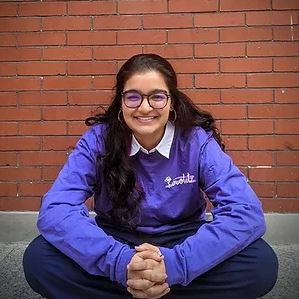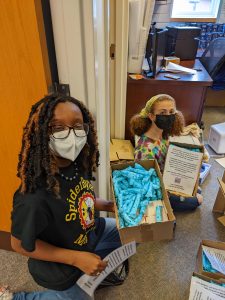Johns Hopkins UniversityEst. 1876
America’s First Research University
Each year, Jenell Coleman, MD, MPH, sees hundreds of female adolescents and young adults in her role as medical director of the Women’s Health Center at the Johns Hopkins Outpatient Center (JHOC) in Baltimore. But she’ll never forget one patient who, when offered a sanitary pad, asked for the entire basket.

“That’s when I started to think about it — period poverty,” says Coleman, who is also the John G. Griffith, MD, Associate Professor of Gynecology and Obstetrics. “We didn’t pay attention to it in our clinics, even though we are Ob-Gyns and we talk about periods. We never thought about whether or not they have adequate supplies.”
Coleman’s interaction with that young woman — as well as others who visited the clinic without an understanding of anatomy or sexual and reproductive health — inspired her and Saumya Sao to create The Violet Project, a digital resource that makes menstrual products, educational resources, and sexually transmitted infection (STI) kits accessible to Maryland adolescents and young adults.
Though not all teens have access to health care and trustworthy health information, 96% do have access to smartphones. By providing comprehensive digital resources, Violet is providing socially vulnerable youth access to reliable, confidential care at no cost.
“I always wanted to help these young people start off their reproductive years with knowledge about reproduction, infections, and themselves,” Coleman says. “To me, Violet is about education and empowerment for our patients and our community.”

Violet is entirely philanthropically funded and provides roughly $20,000 in products to virtual and in-person patients each year. Sao, Coleman’s mentee and research program coordinator of the GYN Specialties Division, built the platform. She and rising Hopkins senior and public health major Yordanos Degefe coordinate product gifts and drives, as well as public donations, to create Violet Packs and “support the population that we serve,” Degefe says.
The in-kind donations are starting to come in from companies across the country, which has allowed Sao and Coleman to expand the program’s reach to the Johns Hopkins Harriet Lane Clinic in partnership with Dr. Maria Trent, division director of adolescent medicine in the Department of Pediatrics. Sao has also expanded the program to eight clinics in the Hopkins Medical System.
Violet packs, which can be ordered from the program’s website or picked up at either clinic, include educational materials, information on at-home STI testing, latex or non-latex condoms or dental dams, health and hygiene products, and a month’s supply of period products.
Violet has partnered with Diva, makers of the DivaCup, for period product donations since the program’s creation in 2021. Diva’s Impact Program has donated nearly $6,000 worth of menstrual cups and accessories, in addition to educational resources.
“I remember one of the reasons why The Violet Project’s application [for product donation] spoke to us was the incredible work that they do on a clinic basis,” says Cassandra Morello, Diva’s impact and communications coordinator. “We don’t usually send 100 cups on a first donation, but I thought the work that they do is really important.”

And though period poverty is often thought of as an international aid issue, many people in the U.S. and Canada struggle with affording menstrual products each month, explains Carly Friesen, DivaCup’s social impact and sustainability manager.
“Period poverty is tied to income inequality and poverty as a whole,” she says. “What a menstrual cup can do is give years and years of period supplies with one single product. So for folks who are able to access that product through donation, it won’t just solve their period needs for a day or a month or a cycle. It solves them for years and years.”
In addition to providing period products and STI testing kits, the website helps connect adolescents and young adults to health care providers though the anonymous Ask Nellie feature.
“We wanted to be a one-stop shop for people,” Sao explains. “We couldn’t find a platform that had a comprehensive bundle of resources prior to building Violet, so it was really important to me that Violet provided education, an anonymous Q&A feature (Ask Nellie), and free sexual and reproductive health products like period products, condoms, and self-collect STI test kits. From my work with youth and previous research, I learned that it would also be extremely important that our platform immediately connected youth to providers for treatment and counseling if they test positive.”
Sao recruited and manages a group of interns, which includes Hopkins undergraduates and medical students. The intern team undergoes comprehensive training so that they are able to provide patients with information and demonstrations on how to use sustainable period products, like menstrual cups or period underwear. They also provide patients with tutorials on how to use the STI testing kits to help eliminate barriers to use.

“We’ve learned that people, particularly youth, are afraid they’ll collect their samples incorrectly, or think that self-collect, mail-in testing is a lot more complicated than it actually is,” Sao explains. “The interns show patients how simple the process is so they can feel more comfortable getting tested in the future, or even share that information with a friend.”
In addition to providing education and resources to Baltimore City adolescents and young adults, the Violet team also works to engage youth through the Violet Voices program. Teens from eight area high schools serve on a youth advisory board and learn advocacy and leadership skills, in addition to participating in conversations about sexual and reproductive health they might not otherwise have at school or home.
The experience has been eye-opening for both the participants and the Violet team. Donovan McClain, a 16-year-old student at Baltimore Polytechnic Institute (Poly) and a youth advocate who leads projects around the city, connected with Violet after their mother forwarded an email from the school’s counselor about the program.
“I’ve learned about different topics, including more about menstrual products, and I help supply students with them at Poly,” McClain says. “I am a queer individual, and Violet has improved my knowledge of queer relations and has made me more aware of the urgent state many of us are in. Violet is my safe space.”
Sao adds the students have taken initiative in their own schools by hanging up informational flyers and educating their peers.
“It’s been amazing to see,” she says. “One of my favorite parts of this program is having real teens in Baltimore be passionate about Violet and being able to give them an opportunity to let their voice be heard.”
Topics: Friends of Johns Hopkins Medicine, Johns Hopkins Medicine, Promote and Protect Health, Strengthening Partnerships